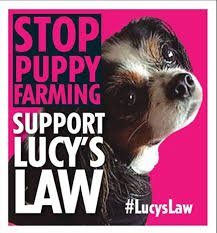Lucy’s Law

Lucy’s Law spells the beginning of the end for puppy farming
Lucy’s Law is a pivotal piece of legislation in the United Kingdom that aims to protect the welfare of pets and curb irresponsible breeding practices. With an estimated 2.6 million puppies sold in the UK each year, the need for reform has become urgent. This article will uncover the essence of Lucy’s Law, its impact on animal welfare, and how it reshapes the pet industry and the responsibilities of prospective pet owners.
Definition and Background:
Lucy’s Law is a legislative measure that came into effect in April 2020. Named after a rescue dog who became a symbol for change, Lucy’s Law was created to ban the third-party sale of puppies and kittens. It was a response to the growing concern over puppy farming and the suffering of countless animals in poorly regulated breeding operations.
Key Provisions:
The law specifically prohibits the sale of puppies and kittens by pet shops and dealers, forcing individuals interested in a new pet to directly visit registered breeders or adopt from rescue centres. This shift is fundamental in ensuring all pets sold have been raised in humane conditions.
Aim and Objectives:
The primary goal of Lucy’s Law is to reduce the demand for puppy farming by eliminating the middlemen who profit from the sale of vulnerable animals. By encouraging responsible breeding and adoption, the law aims to enhance the overall welfare of pets in the UK.
Impact of Lucy’s Law: Successes and Challenges
Positive Outcomes:
Since the implementation of Lucy’s Law, there have been notable successes:
- A significant reduction in the number of puppy farms operating illegally has been reported, with many local councils increasing inspections.
- Adoption rates from shelters have risen, giving more animals a chance at a loving home.
Ongoing Challenges:
Despite the successes, challenges remain. Some issues include:
- Loopholes that allow breeders to evade regulations.
- The difficulty of tracing unlicensed breeders, especially in an increasingly online marketplace.
Areas for Improvement:
Further strengthening of Lucy’s Law could include:
- More robust penalties for violations.
- Greater emphasis on public awareness campaigns regarding responsible pet ownership.
Lucy’s Law and its Effect on the Pet Industry
Changes for Breeders:
Responsible breeders now face stricter regulations that emphasize transparency and animal welfare. Many have adapted by:
- Ensuring complete health checks for puppies and kittens before selling.
- Providing buyers with all necessary documentation, including vaccination records.
Impact on Pet Shops:
Pet shops have adjusted their business models, as they can no longer sell puppies and kittens. This has resulted in:
- A shift toward selling supplies, accessories, and rehomed pets from shelters.
- Increased collaboration with local animal charities to promote adoption.
Rise of Online Sales:
The ban has inadvertently pushed many sales online, making it important for consumers to navigate this new landscape carefully. Challenges include:
- Difficulty in verifying the legitimacy of online sellers.
- The potential for abusive practices to continue under the guise of online businesses.
Understanding Your Responsibilities as a Pet Buyer
How to Find a Responsible Breeder:
When searching for a breeder, keep the following checklist in mind:
- Visit the breeding premises to observe conditions.
- Ask for health certificates and details about the pup’s parents.
- Ensure the breeder is registered and follows local regulations.
Recognizing the Signs of Puppy Farms:
Common warning signs of puppy farms include:
- Multiple litters being offered at once.
- Poor living conditions for the animals.
- Lack of documentation and transparency from the seller.
What to Ask Potential Breeders:
Engage potential breeders with these questions:
- How do you socialise your puppies?
- Can I visit the puppies and their living environment?
- What health tests have been done on the parents?
The Future of Animal Welfare Legislation: Beyond Lucy’s Law
Potential Extensions:
Future legislation could explore additional protections for other animals, ensuring comprehensive animal welfare across the UK.
International Comparisons:
Countries like Germany and the Netherlands have implemented similar laws. These cases can provide insight into effective strategies and potential pitfalls.
Call to Action:
Support local and national organizations that advocate for animal welfare. Your voice can make a significant impact on ensuring further improvements in animal protection laws.
Conclusion:
Lucy’s Law represents a monumental step forward for animal welfare in the UK. With the legislation in place, there is hope for decreasing irresponsible breeding and ensuring every pet is treated with the care they deserve. Responsible pet ownership and continued advocacy are vital for maintaining these positive changes. Together, we can make a difference for animals across the country.
For More Advice and Information Contact Your Local Vets !!
Find your loving pet at BuyAPet.co.uk – ENTER HERE
Need Pet Supplies/Accessories BuyAPet Shop is your Number 1 Shop – ENTER HERE
